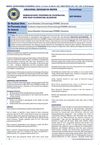Light Microscopy of the Hair: A Simple Tool to Untangle Hair Disorders
January 2011
in “
International Journal of Trichology
”
light microscopy hair disorders hair loss hair shaft anomalies monilethrix pili torti pili annulati tinea capitis piedra pediculosis bubble hair trichostasis spinulosa trichoptilosis trichochalasis trichoschisis trichorrhexis nodosa trichonodosis trichorrhexis invaginata hair casts wooly hair tapered hair exclamation mark hair Menke's syndrome Netherton syndrome ringworm of the scalp head lice

TLDR Light microscopy is useful for diagnosing different hair disorders.
The 2011 document reviews the use of light microscopy as a diagnostic tool for identifying various hair disorders. It details the process of preparing hair samples and describes techniques like individual hair examination and trichogram to assess hair loss and hair shaft anomalies. The document highlights specific hair shaft anomalies such as monilethrix, pili torti, and pili annulati, and discusses infections and infestations like tinea capitis, piedra, and pediculosis. It also describes the microscopic characteristics of conditions like bubble hair, trichostasis spinulosa, trichoptilosis, trichochalasis, trichoschisis, trichorrhexis nodosa, trichonodosis, trichorrhexis invaginata, hair casts, wooly hair, tapered hair, and exclamation mark hair. Genetic syndromes like Menke's syndrome and Netherton syndrome are mentioned in relation to hair abnormalities. Advanced microscopy techniques are suggested to confirm findings. The document is a general review without a specific study population.





